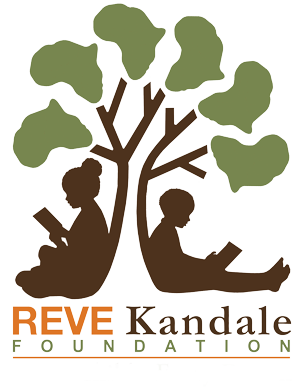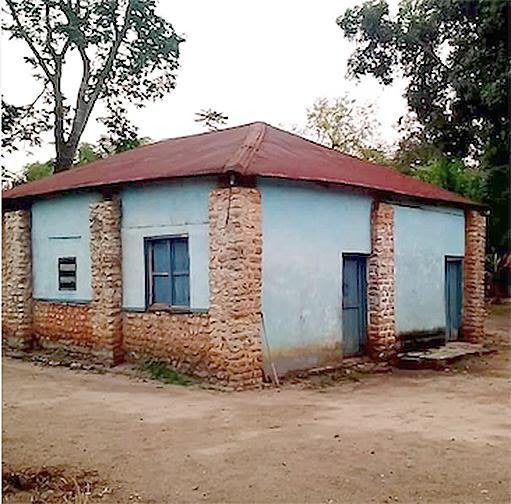Eudes Mashini, Colette Ramm, Pelete and Merveille Gilatulu, in the first Kandale Zoom Meeting (CW), Segond the computer teacher is on the right.
Colette recently hosted a small group of individuals from Kandale via Zoom. They had been taking an intensive course in how to use the laptop, studying Excel, Microsoft Word, sending emails and documents and yes, communicating via Zoom. As Colette tells it, the group was dumbstruck to see Colette on their laptops in real time. Nothing in their experience had prepared them for the possibility of communicating face to face through a flat screen. It was a ‘The Gods Must Be Crazy’ moment. It had only been a few years since Colette had brought a variety of dvd’s to Kandale and played them on her laptop, but this interactive moment was a totally new reality, and with it entirely new opportunities. Here in the U.S. we take for granted the ubiquitous interconnectivity, but for many places in the world this is an abstract concept that no amount of classes in advanced mathematics and physics can prepare you for. Colette gently talked them down off the technological ledge and encouraged them to speak normally and ask questions.
This new form of communication is a culminating event and is a direct result of the many different efforts that preceded it: the installation of the solar panels by Dr Karl Klontz, the donation of laptops by Pfizer in 2018, the building of the Multi-Purpose Building, the installation of a satellite dish, the connection to a host network in France, the need for regular ‘on-the-ground’ communication with the U.S. and most recently the education of the community about the use of this new technology…and of course, eager minds to participate in these lessons.
Enoch is shown teaching on the left. The old PC being carried off for donation on the right.
A computer first arrived in Kandale in 2013. It was donated by a business group that was working in the area. As there was no electricity and no one with any knowledge about how to use it, it sat in its box for three years. In 2016, Colette purchased a laptop for REVE Kandale along with a generator and brought them with her to be used by the REVE Kandale Members. In 2018, the REVE Kandale Board arrived with four working laptops, and solar panels were installed.
Enoch provided basic typing lessons to a few individuals, but the laptops were seldom used as no one understood how to incorporate them into their daily activities. That is until a young community member returned from Kikwit where he had had experience working on a laptop. This first step into the digital age will change many aspects of life in Kandale. Of initial importance will be the ability to receive daily updates on the progress in the village here in the US.
It has become much simpler to receive images and it has made the task of basic communication markedly easier. Colette describes how she used to receive her updates through the process of someone writing a report, photographing it, bicycling on sand roads the 20 miles to Gungu and hoping to coordinate with a satellite and send the document. Often the handwriting was difficult to read and there was no easy way to verify the content of the message. Colette describes having to climb high in a tree in Kandale to receive a signal on her phone all the while being bitten by ants, an unpleasant experience indeed.
Another very important project is under way in Kandale. Community members have been working very hard to restore the old Depot Building. They paid a truck, that was delivering building materials, a little extra money to help transport large stones from the river back up to the town. The stones are being used to rebuild the Depot’s foundation.
The Depot was originally a garage built by the missionaries in the 50’s. (The Depot is pictured to the right.) It then became housing but gradually it came under disrepair. Once the structure has been completed it will support the installation of ten new solar panels and house two mechanical flour grinders and two batteries.
A technique has been developed in Burkina Faso wherein solar panels can generate enough power to run one of the grinders simultaneously. The batteries will allow any extra energy produced by the panels to be stored.
Community members will either pay a nominal fee to have their cassava or millet ground or they will donate a small portion of the flour to the mill. The two flour grinders, solar panels and batteries are presently on their way to Kandale. The photo to the above left is the traditional method of pounding flour using a wooden mortar and pestle or mushi in Kipende. It is a very time consuming and labor intensive technique. The photo in the upper right is the flour mill that is presently on its way to Kandale.
REVE Kandale’s focus is on WATER this year. This winter a third 5,000 liter polytank was installed, raising the available water for Kandale to 15,000 liters. Everything depends on water. The members of the community rely on it for all aspects of their lives from cooking to washing and bathing, including the young girls who are experiencing their period. The local maternity and hospital require water to sanitize their equipment and needles.
All the construction projects need water to make cement and bricks. The large agricultural projects presently underway all depend on water to nurture the young trees and garden projects, which in turn nurture the community that is in great need of a consistent food source. In 2019 REVE Kandale initiated a conversation with Water Mission of South Carolina with the intention of establishing a solar powered pump at the water source to bring water from two miles down in the ravine up to Kandale. Presently everything is under discussion, and it will be presented as soon as more concrete information is available.














